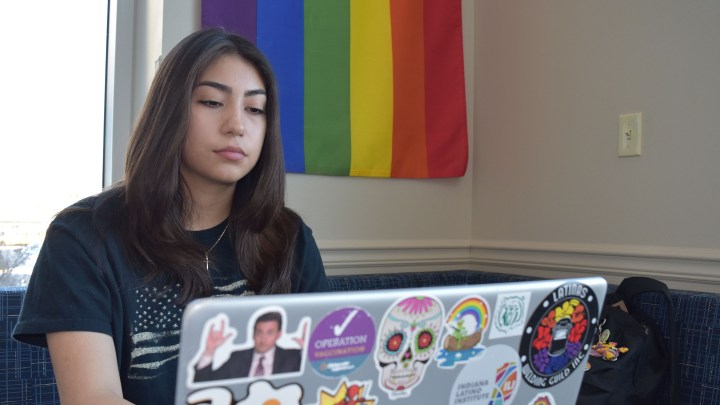
In some states, undocumented students miss out on in-state tuition
In some states, undocumented students miss out on in-state tuition

Indiana is one of 10 states that specifically prohibits undocumented college students from paying in-state tuition. That means an undocumented student in that state could pay nearly $17,000 more per year in tuition than their peers. Many students have to work and enroll part-time or they might drop out if they can’t afford college.
Renee Contreras was born in Mexico and graduated from an Indianapolis high school. As an undocumented first generation Latino student, she’s struggled to find affordable options for college.
“You kind of have to navigate that on your own, which is like pretty scary,” Contreras said. “So a lot of students just kind of feel unmotivated, and feel like there’s not any opportunities for me. So why even try?”
Contreras is one of thousands of students who are ineligible for in-state college tuition because they’re undocumented. To be clear, these students are not part of the Deferred Action for Childhood Arrivals program. That’s because DACA recipients can receive in-state tuition in many states, including Indiana, but not students like Contreras. The DACA program was paused before she could apply.
And receiving state or federal financial aid isn’t an option. Rachel Santos, the director of education policy for the Indiana Latino Institute, said this leads some students to pursue other options.
“Well, a lot of undocumented students actually go to private institutions because private institutions can offer more scholarship[s] because they’re not restricted to the federal funds,” Santos said.
Contreras considered going to a private school and she even qualified for scholarship money. But it still wasn’t enough to make it affordable.
“To find scholarships that work for you as an undocumented student, it is a lot more of hard work to do because a lot of them require proof of citizenship or at least DACA,” Contreras said.
At least 20 states have a law specifically allowing undocumented students to pay in-state tuition, and others don’t have laws at all.
And these barriers could potentially impact the job market. Currently, Indiana struggles to fill more than 200,000 open positions, according to the U.S. Bureau of Labor Statistics. And the state also faces an ongoing decrease in college enrollment.
Earlier this year, Gov. Eric Holcomb wrote an op-ed in The Washington Post with Utah Gov. Spencer Cox, urging federal lawmakers to provide better immigration policies to fill jobs and boost the economy. Holcomb and Cox did not directly address undocumented students or the cost of higher education, but they expressed concerns about the workforce.
“To help us do our jobs as governors, we call on Congress to end its two-decade standoff on setting immigration policy — one of its most basic duties,” they wrote. “And, as leaders of states, we pledge to share the accountability.”
Indiana State Representative Earl Harris authored one of two bills to provide in-state tuition to students like Contreras, to help build a more sustainable workforce.
“More people that we can get into university into college, continue their education, the better it will be, not only for that individual, but it’d be better for our businesses, it’d be better for our state,” Harris said.
So far, his fellow lawmakers haven’t gone for that.
Contreras decided to enroll in community college. She hopes to transfer to a four-year school to pursue a degree in political science.
“I’m still deciding because I feel like I have to keep my options open,” Contreras said. “There’s not a lot of room to dream.”
In order for her dream to become reality, Contreras said she’d need lawmakers to decide that undocumented students like her can get in-state tuition.
There’s a lot happening in the world. Through it all, Marketplace is here for you.
You rely on Marketplace to break down the world’s events and tell you how it affects you in a fact-based, approachable way. We rely on your financial support to keep making that possible.
Your donation today powers the independent journalism that you rely on. For just $5/month, you can help sustain Marketplace so we can keep reporting on the things that matter to you.











